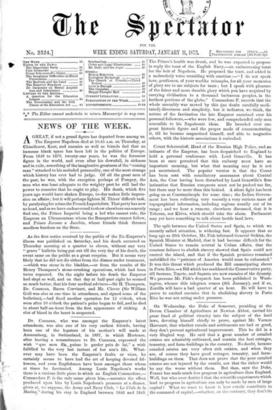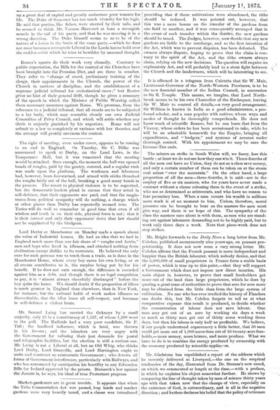On Wednesday, the Duke of Somerset, presiding at the Devon
Chamber of Agriculture at Newton Abbot, carried his great fund of political vivacity into the subject of the land laws, devoting himself chiefly to prove, against Mr. Vernon Harcourt, that whether entails and settlements are bad or good, they don't prevent agricultural improvement. This he did in a very illogical way. He said that a great number of entailed estates are admirably cultivated, and contain the best cottages, tenantry, and farm-buildings in the country. No doubt, because entailed estates are very often rich estates, and when they are, of course they have good cottages, tenantry, and farm- buildings on them. That does not prove that the poor entailed estates are not injured by the entails, nor that the richer would be any the worse without them. But then, says the Duke, France has made much less progress in agriculture than England. Well, but who ever doubte3 that the scientific experiments which lead to progress in agriculture can only be made by men of large capital? What we want to know is how entails contribute to up a great deal of capital and greatly embarrass poor tenants for life. The Duke of Somerset has too much vivacity for his logic. He said that parties, like fishes, were steered by their tails, and he seemed to think Mr. Vernon Harcourt at least a strongish muscle in the tail of his party, and that he was steering it in a wrong direction. The Duke himself seems to us to be of the nature of a lesion in the brain of the same party,—which he does not steer because a retrograde Liberal in the Lords has no hold over the rudder,—but which he tries to bewilder by unsound thought.



































